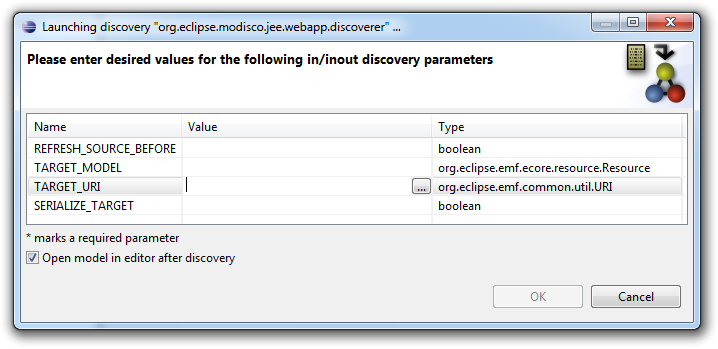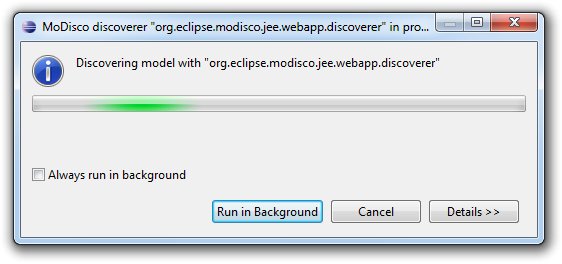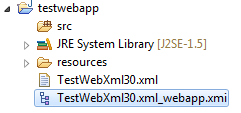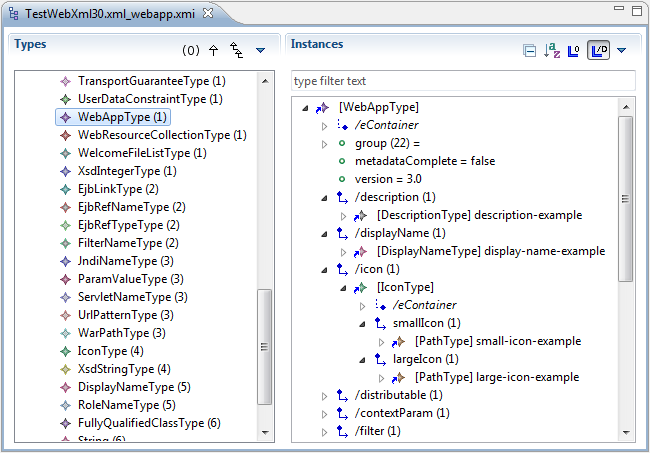Notice: this Wiki will be going read only early in 2024 and edits will no longer be possible. Please see: https://gitlab.eclipse.org/eclipsefdn/helpdesk/-/wikis/Wiki-shutdown-plan for the plan.
Difference between revisions of "MoDisco/Components/JEE/WebApp/Documentation/0.9"
(→Source code) |
|||
| Line 1: | Line 1: | ||
| − | {{MoDiscoTabs|JEE/WebApp| | + | {{MoDiscoTabs|JEE/WebApp|{{MoDiscoTab|JEE/WebApp|Documentation|0.9}}{{MoDiscoTab|JEE/WebApp|Architecture|0.9}}}} |
| − | + | ||
| − | }} | + | |
== Web XML Discoverer == | == Web XML Discoverer == | ||
| Line 8: | Line 6: | ||
=== Details === | === Details === | ||
| − | Considering Web.xml files conforming to DTD or XSD, it | + | Considering Web.xml files conforming to a DTD or XSD, it would be more convenient to have dedicated metamodels to manipulate the information. However, the generic XML Discoverer is an alternative for miscellaneous XML files. |
| − | This plug-in aims at analyzing any Web.xml file providing a model describing the information found. | + | This plug-in aims at analyzing any Web.xml file by providing a model describing the information found. The supported versions are JEE 1.2, 1.3, 1.4, 5 and 6. |
| − | + | ||
| − | + | ||
| + | Moreover, it allows to serialize the xml file back from the model. Thus, some M2M transformation might be used jointly to upgrade some xml files. | ||
| Line 20: | Line 17: | ||
==== Discovering and browsing from contextual menu ==== | ==== Discovering and browsing from contextual menu ==== | ||
| − | The plug-in provides the user | + | The plug-in provides the user a contextual menu to easily create models. |
| + | |||
| + | To discover a Web XML configuration file, right-click on it in the Eclipse '''Package Explorer''' view, and select '''Discovery > Discoverers > Discover JEE web.xml''': | ||
| + | |||
| + | [[Image:MoDisco_Discover_WebXML_menu.png|frame|center|Menu to discover a Web XML file]] | ||
| + | |||
| + | A discovery parameters dialog opens to let you specify the parameters of the discovery: | ||
| + | |||
| + | [[Image:MoDisco_Launching_discovery_org.eclipse.modisco.jee.webapp.discoverer.png|frame|center|Web XML discoverer parameters dialog]] | ||
| + | |||
| + | * Set '''SERIALIZE_TARGET''' to true if you want to save the model to a file | ||
| + | * You can define '''TARGET_URI''' to the location of a file in your workspace. If it is not defined and SERIALIZE_TARGET is true, a model file will be created in the project.<br>'''Beware: the file will be overwritten if it already exists!''' | ||
| + | |||
| + | Once launched, a progress dialog will appear as soon as the operation begins. Depending on the size of your application, the reverse engineering process might take some time to complete: | ||
| − | + | [[Image:MoDisco_discoverer_org.eclipse.modisco.jee.webapp.discoverer_in_progress.png|frame|center|Progress dialog during model creation]] | |
| + | At the end of the process, the newly created model file is added to the root of your project if you set SERIALIZE_TARGET to true: | ||
| + | [[Image:MoDisco_WebApp_Model_inWorkspaceProject.png|frame|center|Web XML model in the Package Explorer]] | ||
| − | + | And the model is opened in the default model browser if you selected '''Open model in editor after discovery''': | |
| − | + | [[Image:MoDisco_WebXML_inModelBrowser.png|frame|center|Web XML model in the MoDisco model browser]] | |
| + | The Web XML XMI files (with a filename ending in ".xml_webapp.xmi" by convention) can be opened in any model browser: | ||
| + | [[Image:MoDisco_WebXML_OpenWith.png|frame|center|Opening a Web XML model]] | ||
| − | |||
| − | + | == Source Repository == | |
| − | + | ||
| − | + | All the source code is stored in the Eclipse public source repository: | |
| − | + | ||
| − | + | * metamodel : https://dev.eclipse.org/svnroot/modeling/org.eclipse.mdt.modisco/plugins/trunk/org.eclipse.modisco.jee.webapp/ | |
| + | * discoverer : https://dev.eclipse.org/svnroot/modeling/org.eclipse.mdt.modisco/plugins/trunk/org.eclipse.modisco.jee.webapp.discoverer/ | ||
[[Category:MoDisco]] | [[Category:MoDisco]] | ||
| + | {{MoDisco}} | ||
Revision as of 05:44, 30 March 2011
| MoDisco |
| Website |
| Download |
| Community |
| Mailing List • Forums |
| Bugzilla |
| Open |
| Help Wanted |
| Bug Day |
| Contribute |
| Browse Source • Project Set File |
Contents
Web XML Discoverer
The goal of the Generic Web Xml Discoverer plug-in is to allow generic extractions of information from a Web.xml file, without the need for a metamodel dedicated to a conforming Document Type Definition(DTD) or XML Schema Description (XSD).
Details
Considering Web.xml files conforming to a DTD or XSD, it would be more convenient to have dedicated metamodels to manipulate the information. However, the generic XML Discoverer is an alternative for miscellaneous XML files.
This plug-in aims at analyzing any Web.xml file by providing a model describing the information found. The supported versions are JEE 1.2, 1.3, 1.4, 5 and 6.
Moreover, it allows to serialize the xml file back from the model. Thus, some M2M transformation might be used jointly to upgrade some xml files.
User manual
The plug-in provides the user a contextual menu to easily create models.
To discover a Web XML configuration file, right-click on it in the Eclipse Package Explorer view, and select Discovery > Discoverers > Discover JEE web.xml:
A discovery parameters dialog opens to let you specify the parameters of the discovery:
- Set SERIALIZE_TARGET to true if you want to save the model to a file
- You can define TARGET_URI to the location of a file in your workspace. If it is not defined and SERIALIZE_TARGET is true, a model file will be created in the project.
Beware: the file will be overwritten if it already exists!
Once launched, a progress dialog will appear as soon as the operation begins. Depending on the size of your application, the reverse engineering process might take some time to complete:
At the end of the process, the newly created model file is added to the root of your project if you set SERIALIZE_TARGET to true:
And the model is opened in the default model browser if you selected Open model in editor after discovery:
The Web XML XMI files (with a filename ending in ".xml_webapp.xmi" by convention) can be opened in any model browser:
Source Repository
All the source code is stored in the Eclipse public source repository:
- metamodel : https://dev.eclipse.org/svnroot/modeling/org.eclipse.mdt.modisco/plugins/trunk/org.eclipse.modisco.jee.webapp/
- discoverer : https://dev.eclipse.org/svnroot/modeling/org.eclipse.mdt.modisco/plugins/trunk/org.eclipse.modisco.jee.webapp.discoverer/
| MoDisco | |
| Components | Infrastructure: KDM · SMM · GASTM · Model Browser · Discovery Manager · MoDisco Workflow · Query Manager · Facet Manager · Metrics Visualization Builder · KDM Source Extension Technologies: Java · JEE · EjbJar · WebApp · XML Use Cases: Simple Transformation Chain · Model Filter |
| Help | Installation · SVN |
| Project | API Policy · Retention Policy · Project Plan · metrics · Accessibility Guidelines · Capabilities Disablement |






